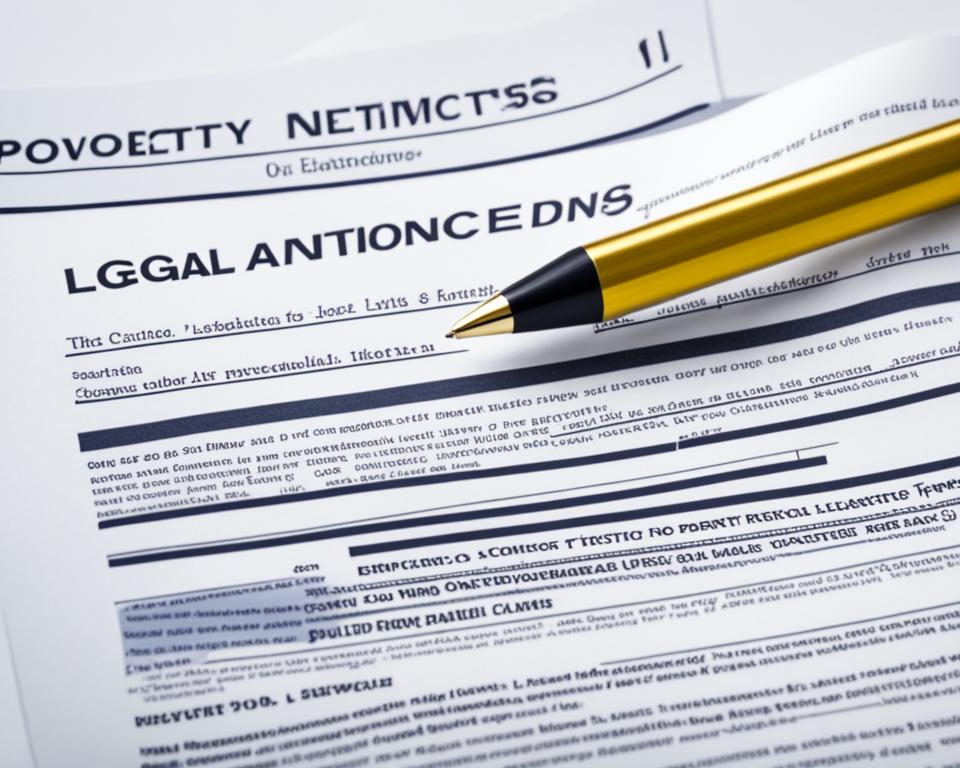Have you ever wondered how a single notice can disrupt a property sale or halt financing opportunities?
In Florida, a Lis Pendens, which literally translates to “pending lawsuit” from Latin, plays this potentially disruptive role. It serves as a notice that real estate is under judicial scrutiny due to ongoing litigation. This can arise from probate disputes, foreclosure actions, real estate contract disputes, quiet title actions, or even divorce cases.
Often referred to as a “cloud on title,” a Lis Pendens significantly impacts property sales and financing. It warns potential buyers and creditors about existing legal disputes concerning the property. This “cloud” complicates an owner’s ability to sell or refinance, exerting pressure to resolve the lawsuit and clear any associated debts.
Interestingly, not all lawsuits can justify filing a Lis Pendens. Under Florida Statute, § 48.23, it should only be filed if the lawsuit directly affects the right to possess the property. The notice must be recorded with specific details like names of the involved parties, lawsuit information, court details, property description, and the sought relief concerning the property.
Understanding the Lis Pendens process in Florida is crucial. This understanding can help you navigate potential risks and align your plans accordingly, be it buying, selling, or financing real estate. It’s always a wise move to consult with a Lis Pendens attorney in Florida when dealing with such complexities.
Definition and Importance of Lis Pendens
A Lis Pendens serves as a formal notice that a specific property is involved in a legal dispute. This warning alerts potential buyers and creditors to ongoing litigation which could affect property rights. Understanding the effects of a Lis Pendens on property in Florida is crucial for anyone involved in real estate transactions.
Lis Pendens Definition
In Florida, there are two types of lis pendens: lis pendens of right and garden variety lis pendens. A lis pendens of right is based on a recorded lien or another recorded instrument, like a mortgage. This means there’s official documentation backing the claim. On the other hand, a garden variety lis pendens does not require a recorded instrument but needs a judge’s approval.
No bond is needed to maintain a lis pendens of right. However, for a garden variety lis pendens, posting a bond might be necessary to protect the property owner from damages in case the claim is deemed unjustified.
Importance of Lis Pendens in Florida Real Estate
Understanding how to file a Lis Pendens in Florida can be critical in protecting one’s interest in disputed property. For buyers, a lis pendens can indicate significant risks. For instance, a wrongful lis pendens can be removed by a judge, and the responsible party may face liability.
While a lis pendens doesn’t outright block property sales, it complicates securing clear title. Most title companies won’t insure or close without resolving the lien. Moreover, knowing the lis pendens requirements in Florida is necessary for anyone considering action affecting property status. Such lawsuits may include foreclosure actions, contract disputes, probate issues, and others.
In general, a lis pendens is essential for creditors as it signifies that the property cannot secure loans until the matter is resolved. This “cloud on title” means that buyers may encounter risks if judgments or orders affect the seller after their purchase, potentially complicating the transaction. Therefore, diligent attention to detail when filing is paramount for compliance with Florida statute requirements.
The Process of Filing a Lis Pendens in Florida
Filing a lis pendens in Florida is essential when dealing with litigation affecting property titles. To begin, one must understand the specific legal requirements and steps involved.
Steps Involved in Filing
First, you need to prepare a notice. This involves collecting details about the parties, the lawsuit’s institution date, court name, property description, and the relief sought. This notice aims to signal that the property is tied to ongoing litigation. Once prepared, you submit the notice to the Public Records office in the county where the property is located.
It’s important to know how to file a Lis Pendens in Florida correctly. Failure in accuracy could mean the document won’t be accepted, delaying your litigation.
Legal Requirements and Considerations
The lawsuit must exhibit a “fair nexus” to the property, or it should be based on a “duly recorded instrument” like a mortgage. It’s not just about recovering monetary damages; the suit must affect the title or right of possession of the property. Misfiling could require you to post a bond, which may reach hundreds of thousands of dollars, as damages could include market value differences and attorney’s fees.
Understanding Lis Pendens requirements in Florida can save time and prevent costly mistakes. This process serves to notify third parties and protect claimants. However, improperly filed lis pendens can lead to severe penalties, including the potential for punitive damages.
Always consult legal professionals to navigate the intricacies and ensure compliance with Florida laws, making the Lis Pendens search Florida part of your thorough preparation.
What Is A Lis Pendens In Florida?
A Lis Pendens in Florida represents a legal dispute involving real estate under court control due to pending lawsuits. These lawsuits often encompass probate disputes, foreclosure actions, real property contract disputes, divorce cases, and quiet title actions. When a *Lis Pendens* is filed, it serves as a notice to potential buyers about the ongoing litigation that might affect their ownership rights, making it crucial for anyone interested in the property to perform a thorough Lis Pendens search Florida.
In Florida, it’s critical to understand that a Lis Pendens should only be filed when the lawsuit directly impacts the property’s title or right of possession. This filing is recorded with the Public Records office in the county where the property is located. Buyers should know that even though they can purchase property under a Lis Pendens, their ownership rights could be subject to the court’s decisions in the pending lawsuit. Consulting with a knowledgeable Lis Pendens attorney Florida can be crucial in navigating these claims successfully.
Florida law recognizes two types of Lis Pendens: the lis pendens of right and the garden variety lis pendens. The lis pendens of right is based on recorded instruments like mortgages and doesn’t need a bond, while a garden variety lis pendens may require a bond if the proponent prevails in an evidentiary hearing. Both types serve as notices to prospective buyers about claims against the property, protecting claimants from losing their rights to a subsequent purchaser. Despite common belief, a Lis Pendens doesn’t prevent an owner from selling the property but can complicate transactions as title companies may not provide insurance, and closing agents may hesitate to proceed without the lien being bonded.
A wrongfully filed Lis Pendens can be removed by the judge, and improper filing could expose the filer to liability, potentially leading to punitive damages. David Steinfeld, a business law expert in Florida, can provide valuable insights on these matters, with his extensive experience and recognition in the field.
Lis Pendens is a common tool for many lawsuits involving title or interest in property in Florida. It acts as a notice to third parties about pending litigation concerning the property’s title or interest. This notification can deter buyers, mortgage lenders, or title insurance companies from engaging with the property. Hence, performing a comprehensive Lis Pendens search Florida is essential for anyone involved in property transactions. Proper basis is necessary for filing Lis Pendens, and there’s a risk to a party that files without a valid basis. Understanding the nuances of Lis Pendens with the advice of a seasoned Lis Pendens attorney Florida can help manage and mitigate any associated risks effectively.
Effects of Lis Pendens on Property Transactions
When a Lis Pendens is filed, property transactions in Florida can become incredibly complicated. This notice, stemming from pending litigation, places a “cloud on title,” dramatically affecting property sales, financing, and title insurance processes. Let’s explore how this unfolds.
Impact on Property Sales
Real estate selling becomes a tough task when a Lis Pendens is involved. Prospective buyers often shy away, unsure of potential legal entanglements. The uncertainty surrounding the clear title makes it a risky investment. This constant state of legal limbo makes properties with a Lis Pendens notoriously unsellable.
Effects on Financing and Title Insurance
The impact of a Lis Pendens extends beyond sales; it also hits financing and title insurance. Lenders and title companies are reluctant to engage with properties engulfed in litigation. Without a clear title, securing a mortgage becomes nearly impossible. Title insurers also avoid issuing policies, further hampering the transaction process.
If you’re navigating this daunting landscape, involving a Lis Pendens attorney in Florida can be a wise move. Legal expertise can help mitigate the daunting effects on your property, illuminating the path forward.
Lis Pendens vs. Foreclosure: Key Differences
When it comes to understanding the Lis Pendens effects on property in Florida, it’s crucial to differentiate it from foreclosure. Both have significant implications for property owners and buyers, but they serve different purposes and follow distinct legal procedures.
A lis pendens is a notice that warns any potential buyers or creditors that a lawsuit involving the property is ongoing. This notice creates a cloud on the title, meaning the property can’t be sold or dealt with easily. According to Suarez v. KMD Constr., Ins., a properly filed lis pendens protects a plaintiff from intervening liens that may affect property rights.
Foreclosure, on the other hand, is a legal action initiated by a lender to reclaim ownership of a property due to the owner’s failure to make mortgage payments. Unlike a lis pendens, which merely informs of a pending lawsuit, foreclosure culminates in the forceful sale of the property to satisfy the debt.
One major distinction is in terms of procedural requirements. A properly filed lis pendens may require a bond, especially if it falls under the garden variety category, which isn’t based on any recorded document and requires judicial discretion. The bond, as noted in DeGuzman v. Balsini, serves as a safeguard for property owners against unjustified lis pendens notices.
In contrast, foreclosure involves a more straightforward process where the court supervises the sale of the property to recover the outstanding loan amount. This direct approach often accelerates the property’s transition out of the owner’s possession.
Damages for an improperly filed lis pendens can be extensive, including fair market value depreciation and consequential damages like attorney’s fees, as highlighted in FCD Dev., LLC v. S. Fla. Sports Comm., Inc. Foreclosure, while financially devastating due to loss of the property, doesn’t generally incorporate such compensatory measures.
It’s essential to understand that while a lis pendens does not outright prevent the sale of property, it significantly hinders the process by discouraging buyers. Most title companies refuse to insure or close on properties with a lis pendens unless it’s bonded, contrasting the more definitive action of a foreclosure that ends with the property being taken over or sold by the lender.
In summary, both Lis Pendens vs foreclosure in Florida represent different stages and types of legal encumbrances on property, each with unique legal implications for all parties involved. Tailoring your approach based on these differences can better prepare you for navigating property disputes in Florida.
Common Reasons for Filing Lis Pendens
Filing a Lis Pendens can be a crucial step in various legal disputes involving real estate in Florida. This notice of litigation serves multiple purposes and stems from differing origins. As an integral part of the Lis Pendens process in Florida, it’s important to understand the common reasons behind these filings.

Probate Disputes
Probate disputes are one of the most frequent reasons for filing a Lis Pendens. When the distribution of an estate’s properties is contested, filing a Lis Pendens ensures that any real estate involved in the probate case cannot be sold or mortgaged until the dispute is resolved. This adds a layer of protection for all parties involved, ensuring the rightful heirs or beneficiaries can claim their share.
Foreclosure Actions
Foreclosure actions and mortgage defaults also lead to the filing of a Lis Pendens against real estate in Florida. This action is typically used by lenders to notify others of their claim on the property when an owner defaults on mortgage payments. It helps to safeguard the interest of the lenders against the property while foreclosure proceedings are underway.
Real Property Contract Disputes
Real property contract disagreements are another common legal matter resulting in Lis Pendens filings. When there’s a breach of a real property contract, the aggrieved party often files a Lis Pendens to prevent any transfer of the property’s title. This ensures that the property remains contested until the court reaches a decision, protecting the plaintiff’s interest in the property.
Overall, these reasons underline the importance of understanding *how to file a Lis Pendens in Florida*. Whether it’s handling probate disputes, addressing foreclosure actions, or settling real property contract issues, knowing the Lis Pendens process in Florida is invaluable. Ensuring you have a trusted Lis Pendens attorney Florida is also crucial for navigating these complexities effectively.
How to Challenge and Remove a Lis Pendens
If you find yourself dealing with a Lis Pendens, knowing how to challenge and remove it can be crucial. The lis pendens serves as a constraint on your property rights, affecting your ability to sell, finance, or secure title insurance for the property. It’s essential to approach the situation with a clear strategy.
Legal Grounds for Challenging a Lis Pendens
To challenge a lis pendens, one must demonstrate that the lawsuit lacks a fair nexus to the property or is not based on a duly recorded instrument as outlined in Florida statutes (source: Conseco Servs., LLC v. Cuneo, 904 So. 2d 438, 439 (Fla. 2d DCA 2005)). I recommend consulting a Lis Pendens attorney in Florida to provide the necessary legal expertise and guidance.
Steps to Remove a Lis Pendens
There are several steps to follow when seeking to remove a lis pendens:
- File a Motion: Start by filing a motion in court to dissolve the lis pendens. This motion should outline why the filing is improper.
- Prove Improper Filing: During the evidentiary hearing, you’ll need to present evidence proving that the lis pendens does not meet the Lis Pendens requirements in Florida.
- Bond Requirement: The judge may require a bond to cover any damages caused by the wrongful lis pendens. If you don’t comply with this, the lis pendens will be dissolved (source: DeGuzman v. Balsini, 930 So. 2d 752, 754 (Fla. 5th DCA 2006)).
The damages for an improperly filed lis pendens can be significant, including attorney’s fees and depreciation in property value from the time of filing to termination (source: FCD Dev., LLC v. S. Fla. Sports Comm., Inc., 37 So. 3d 905, 909 (Fla. 4th DCA 2010)). Consulting with a Lis Pendens attorney in Florida is advisable to navigate these complexities and ensure all procedures are correctly followed.
Are Big Black Birds in Florida Mentioned in Lis Pendens Cases?
Lis pendens cases in Florida typically pertain to property disputes, but they rarely involve wildlife matters. However, the presence of big black birds in florida, such as crows or vultures, can sometimes indirectly impact property conditions or assessments, potentially becoming a tangential mention in certain legal or environmental contexts.
Conclusion
Understanding the intricacies of a lis pendens is crucial for navigating Florida’s real estate landscape. This legal notification, which must be recorded in the official records of the county where the property is located according to Florida Statutes § 48.23(1)(a), serves as a warning of a pending lawsuit related to the property. It functions as a “cloud on the title,” effectively preventing property owners from selling or dealing with the property, thereby deterring prospective buyers and lenders.
Filing a lis pendens requires a proper basis, and if filed without one, it carries significant risks. This notice can be challenged if it is not “founded on a duly recorded instrument” (Fla. Stat. § 48.23(3); Daugherty v. Daugherty, 509 So. 2d 1289, 1290). In case of an unjustified lis pendens, the plaintiff may need to post a bond to protect the property owner from potential damages. These can include attorney’s fees and the difference in the property’s fair market value before and after the filing, as highlighted in FCD Dev., LLC v. S. Fla. Sports Comm., Inc., 37 So. 3d 905, 909.
Given the complexities and potential implications of a lis pendens on property transactions, consulting with a specialized Lis Pendens attorney in Florida is highly advisable. They can provide essential guidance and protect your rights and interests. Recognizing the significant impact that a lis pendens can have on real estate dealings, it is imperative to understand both its definition and effects, ensuring informed decisions and smoother property transactions in Florida.

